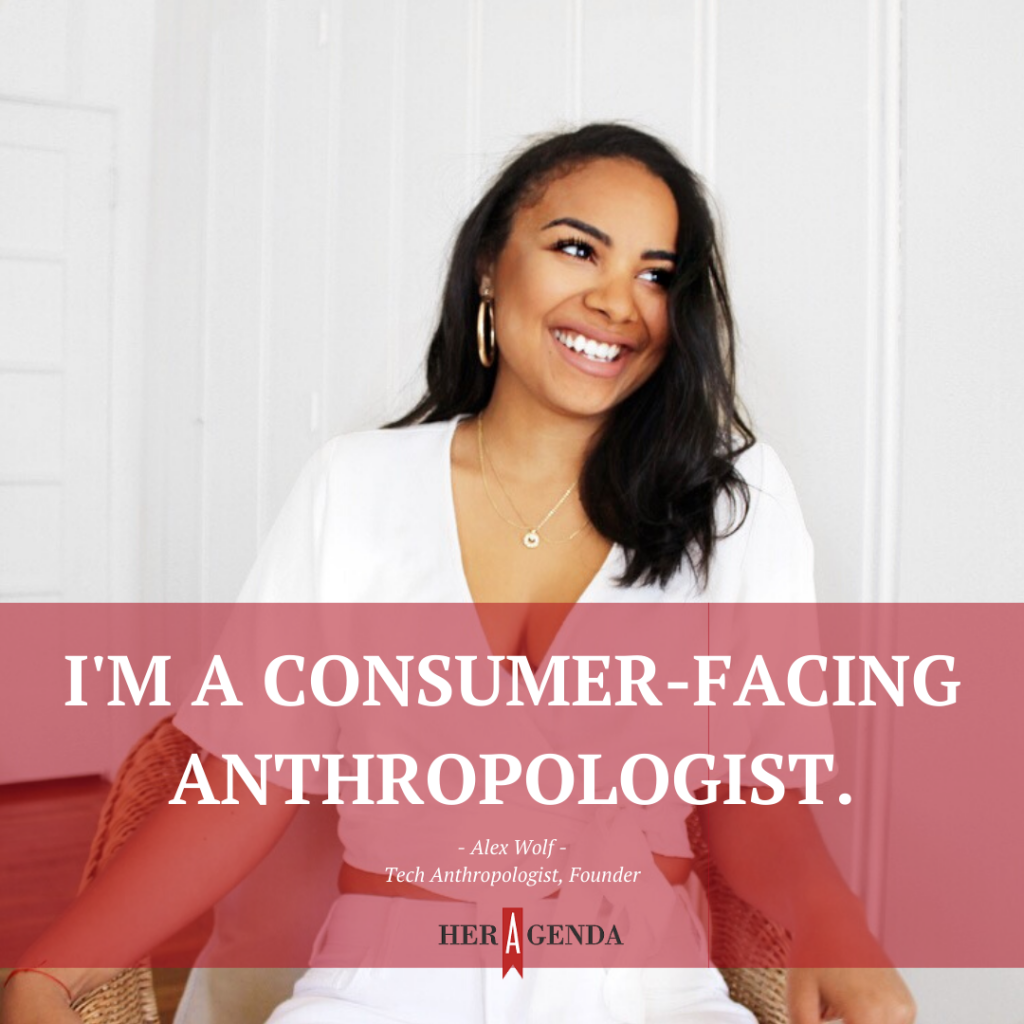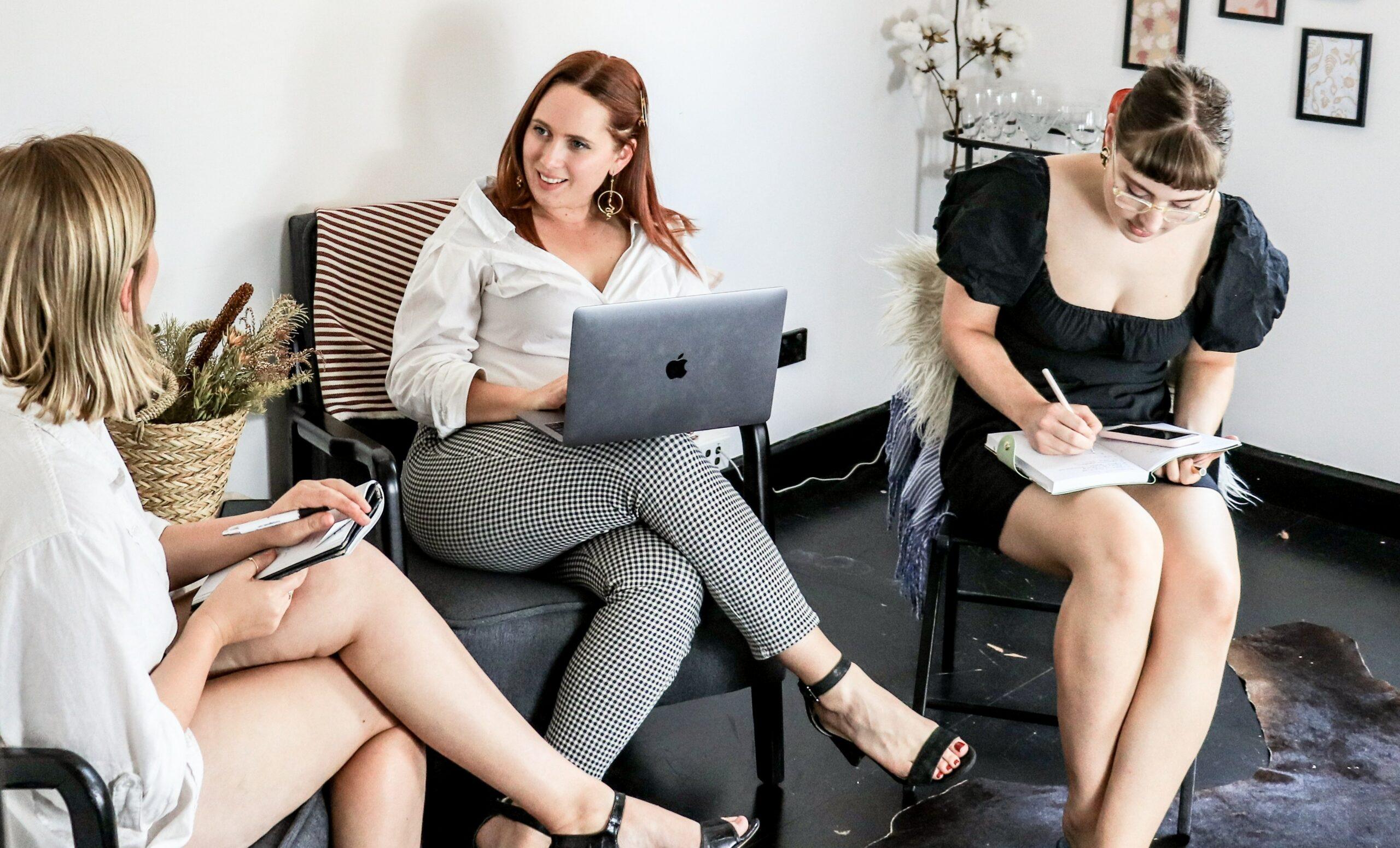Anyone who follows the esteemed tech anthropologist, Alex Wolf knows that she is oftentimes ahead of the curve, predicting trends in the market well before her peers. Featured across major publications including Forbes,Fast Company,Adweek, Inc., and many others, Alex’s work has captivated audiences for years.
At the age of 21, Wolf dropped out of college to build what would become the fastest-growing digital network of female millennial entrepreneurs online with a following totaling up into the millions. She eventually sold her brand and has been advising the world’s best investors, marketers and designers on how to market, brand and design creative consumer-facing products ever since.
With a knack for ideas that provoke and challenge us all to explore the relationship between humans and technology, creatives and major brands alike look to Alex for ways to connect with their audiences in a meaningful way and provide real value to customers. In 2018, she authored her best-selling book, Resonate: For Anyone Who Wants To Build An Audience, which explores how understanding human nature and technology creates a following.
Her Agenda sat down with Wolf to discuss her story, what it means to pioneer human-friendly technology, how to resonate with an audience, and the recent launch of Creative Business School, aimed at supporting creatives marketing themselves in a way that feels comfortable for them.
Her Agenda: Can you tell us about your background, story and how you become passionate about technology?
Alex Wolf: I grew up with a dad in technology. My dad actually went to law school, but in the 90’s you could make way more money in IT than you ever could as a lawyer. Because the skill was valuable at that time my dad was always good with and passionate about computers. As a result, I grew up with a lot of technology in my house including hardware and new software. I also grew up as an only child. What I like to say is that the computer was my sibling. As far as my source of entertainment and education, that early exposure created an inclination towards and passion for technology.

Her Agenda: How would you describe your career path up until now?
Alex Wolf: I would say it’s been a lot of improvisation. I got into social media before it was an industry. It is like Jay-Z getting into hip hop before it was a real industry. You understand some people are making something out of this, but you didn’t really know what type of market you are going to land on because it is forming as you are getting involved with it. So because of that, I feel I stumbled into where I am now. I am very happy about it and there wasn’t a blueprint. I didn’t have a clear vision of where all this was going to land. I remember reading an article about a young girl, who set up a Myspace layout page, made millions of dollars from Google ads as a teenager, and bought her parents a house.
-Many individuals get so caught up in trying to grow their following that they forget why they started in the first place.
Stories like hers really inspired me, made me understand the power of the internet and see it as a business asset. I pressed a lot of buttons and figured everything out. I taught myself how to make a website. I taught myself how to use social media for a brand. I made it here through a lot of trial and error and not being afraid. I was afraid to fail, but I still tried anyway.
What I like to say is that the computer was my sibling. As far as my source of entertainment and education, that early exposure created an inclination towards and passion for technology.
Her Agenda: At 21 you dropped out of college to build what would become the fastest-growing digital network of female millennial entrepreneurs online. What gave you the courage to do so and what would you say to other young women interested in launching their own company?
Alex Wolf: I knew that I wanted to use the internet to make money. I had a hard time in school, period. I love learning, but I had a hard time with the institution of school and I was also paying for school. I kept asking myself if attending school was what I wanted to do. I took a huge risk by dropping out because both of my parents are educated and all of my friends were going to school. I was in an environment where that was the expectation. I would tell women who are trying to start businesses today that you must understand what your market is. I don’t like to lose people with business jargon. When I say market I mean the group of people you want to sell to. Do they exist and do they want your product? 42% of startups fail simply because there is no market need or desire. If you’re getting into business, you should have a long-term plan. This is so important. I find that because of social media people will jump into business for the optics but it’s those crucial questions that are the real keys to success.

Her Agenda: TEDx crowned you as a “Tech-Philosopher.” How does your work align with and/or differ from past and current philosophers in the industry?
Alex Wolf: My philosophy is cut from the same school of thought as the designer, Buckminster Fuller, and philosopher, Alan Watts. They were actually good friends. Their school of thought was focused on cybernetics, which is basically the intersection of the human body and technology and understanding technology as an extension of humans’ anatomical limits. A lot of our technology is built under this conception that we are separate from our environment, then we create technology that creates a lot of disharmony between us and our universe. Buckminster Fuller, Alan Watts, and the philosophers from that school of thought see the universe as one organism and technology as an expression of it. The idea is that either you create with the universe as if you are one with it or you create as if you are separate.
Even in today’s time, what is currently happening with this pandemic has proven how much we are one as a universe. Buckminster Fuller was the inventor of the geodesic dome and provided innovative architecture for city design. This is where we get our understanding of human-friendly design.

Her Agenda: COVID-19 has rapidly changed how we interact with technology.
Alex Wolf: It’s ironic because a few weeks ago when Kobe passed, the message was life is short, right? Now, this is happening and a lot of people are realizing their life can be short. The virus deepened this ephemerality of life and existence. As scary as this is, one of the consequences is definitely a heightened awareness, an increased appreciation and a different association with who you are as a being in relation to your environment. We are so much more sensitive about how things get passed on. Our culture gets a bad rap as being isolated and anti-social [but] this is showing us we actually do hang out in public spaces. So much of our economy and our society is built around large groups of people coming together for a purpose. Right now people are being tested and reevaluating what they want to do and what it looks like to make life meaningful.
Her Agenda: Apple, Google, and other tech giants have in-house philosophers. There has been increased criticism around the fact that these philosophers are not permitted to speak publicly about their work given their impact on people’s everyday lives. You regularly speak publicly about your work, what has been your experience advising tech companies?
Alex Wolf: I’m a consumer-facing anthropologist. Today’s media climate isn’t friendly to old school, academic books. That is part of the reason why I became innovative about what medium I chose to communicate on. In house tech philosophers serve the purpose of assisting the company with positioning itself. Everyday consumers are just as immersed with all the technology philosophers are producing so we deserve to have opinions and insights on how this technology is impacting us on an economic and social level. What I found in working with tech companies is that most individuals who work at the tech companies or in these particular divisions are very keen and aware of what’s going on. The gap I see and hope to solve for is how do we get these individual concerns to reflect throughout the company as an entity? That is where things get lost. A lot of tech companies are public, humongous companies and so there’s a long roadmap from having a dialogue about design and ethics to the public-facing messaging shared with consumers.
-I knew that I wanted to use the internet to make money.
Her Agenda: Many would say you are oftentimes ahead of the curve, exploring and sharing trends in tech months or years before the larger industry does. What would you say is the reason for this? Is there a habit or trait you have cultivated that allows you to continue to pioneer thought leadership?
Alex Wolf: I don’t have a method per se. What ends up happening is I pay attention to things that might go under the radar for other people. I’m able to draw out a pattern from what I’m noticing. From there, I make predictions. That is honestly the best way I can answer, I don’t have a go-to method.

Her Agenda: What have been the biggest changes in how humans interact with technology over the past decade?
Alex Wolf: The biggest change is the removal of presence out of our lives and our conversations. I pay a lot of attention to telecommunication, which looks at how we communicate. Effective conversations need two parties to be present in order for the messages to be comprehended successfully. Presence is spiritual and a huge factor in every element of life. It is the relationship between time and space.
-Art is the bloodline of culture. It is what adds meaning to our lives. It is the way we share our stories. It is the way that humanity has continually been able to thrive and not just survive. The book aims to inspire creatives to build businesses in a way that is sustainable and fulfilling.
A lot of our technology, especially social media technology is incentivized to be designed in a way that requires passive attention. This is okay for certain tech companies if that is their business model, but it has huge societal consequences. The result is you have a nation or even a globe of people who are finding it difficult to be present with each other or are intimidated by presence. We have taken a huge hit because we have forgotten how to have conversations with presence. The removal of presence in our telecommunications has caused a huge generational gap between us and our elders. I think it will continue to create a generational gap between us and the people who are younger than us. These gaps result in risks that are bigger than what they might appear at first. They cause risks in our politics. They cause risks in our economy. Presence is critical.

Her Agenda: In your book, Resonate, you encourage creatives to explore the role of understanding human nature and creativity to successfully connect with an audience. What is your hope for those who read your book?
Alex Wolf: I see creatives fall under the trap of vanity metrics. You have someone who is super talented at something and has the intention of going on social media to express this beautiful talent that the world would love and appreciate. But if they get too caught up in vanity metrics, and when I say that, I mean followers or any type of engagement. The biggest takeaway I hear from those who read my book is gratitude for reminding them they are artists and love to do what they do. Many individuals get so caught up in trying to grow their following that they forget why they started in the first place.
-So much of our economy and our society is built around large groups of people coming together for a purpose. Right now people are being tested and reevaluating what they want to do and what it looks like to make life meaningful.
We cannot afford to lose the quality of our art in the name of these algorithms. Art is the bloodline of culture. It is what adds meaning to our lives. It is the way we share our stories. It is the way that humanity has continually been able to thrive and not just survive. The book aims to inspire creatives to build businesses in a way that is sustainable and fulfilling.

Her Agenda: You very recently launched Creative Business School, a comprehensive program that shows you how to create a thriving creative business without sacrificing passion or personal life. What was the inspiration for creating a tool like this and what can those who participate get out of it?
Alex Wolf: The mission for Creative Business School is to show creatives, even those with small audiences, they can create a healthy income for themselves by shifting their mindset from being solely an influencer into being more of a business person. My goal is to support creatives who have even a little bit of clout in successfully merchandising their brand with their own IP or signature product that they can sell over and over again. Every entertainer we look up to successfully made it because they merchandised a brand that fit them like a glove. Creative Business School is about helping creators feel more comfortable with business and find that scalable product that excites them like Jay-Z’s ACE of Spades and Rihanna’s Fenty line.
-Effective conversations need two parties to be present in order for the messages to be comprehended successfully. Presence is spiritual and a huge factor in every element of life. It is the relationship between time and space.
Her Agenda: What’s the best advice you’ve ever been given?
Alex Wolf: Don’t want things that don’t want you back.
-A lot of our technology, especially social media technology is incentivized to be designed in a way that requires passive attention. This is okay for certain tech companies if that is their business model, but it has huge societal consequences.
Her Agenda: What is a book you are reading right now?
Alex Wolf: Four Ways To The Center by Alan Watts.

Want more insight from Alex? Join us on April 7th for a special webinar led by her!










